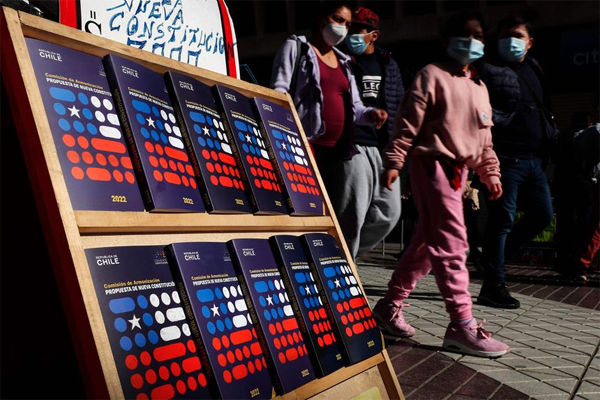
The 388-article proposed charter, up for a vote on Sept. 4, could destroy the country’s economy and democracy.
By Axel Kaiser
The citizens of Chile will soon vote on a proposed constitution that’s being heralded as one of the most progressive in the world. The 388-article charter was drafted by a left-wing convention called in the aftermath of violent protests of October 2019. If voters approve it on Sept. 4, it could destroy Chile’s economy, democracy and integrity as a nation.
One of the first things the new constitution would undermine is the independence of the judiciary. The proposed constitution would create a new entity, the Council of Justice, to evaluate judges’ performance and decide whether they can remain on the bench. The consequence would be to bring the judiciary under political control. On this score, former President Eduardo Frei Ruiz-Tagle has said that the constitution could pave the way to a “dictatorial regime.”
The proposal also sets its sights on the political balance of powers. Like Hugo Chavez’s 1999 Venezuelan Constitution did, Chile’s proposed constitution would eliminate the Senate—a more than 200-year-old institution that has historically played a crucial role in balancing political power. Under the new system, a single chamber would reign, with little external or internal check on its power. Álvaro Elizalde, a Socialist Party member and current president of the Senate, has admitted that the new constitution’s political system “does not comply with the minimum standards required by Chile’s democracy.”
The constitution would also make the country “plurinational,” recognizing 11 indigenous groups—for starters. Each could potentially be entitled to function as an autonomous community governing its own territory. The government would also guarantee restitution for historically indigenous lands, compensating current owners an undefined “fair price.” The constitution would also create a parallel justice system for indigenous groups—a combination ripe for confusion and conflict.
Other rule-of-law protections would suffer, too. That would be a boon to the international drug cartels already operating in the country, which have made Chile the region’s third-largest illegal-drug exporter to Europe. Some criminal organizations, such as Colombia’s FARC, have proven ties to Chilean terrorist groups that claim to be fighting for the cause of indigenous groups while trafficking drugs and killing anyone who dares to resist them. Autonomous territories have long been one of their demands, which would allow them to conduct their operations with impunity.
A growing number of nonradical indigenous representatives have already announced their opposition. Hugo Alcamán, a leader of the Mapuche group of southern Chile, has declared that he will vote against the initiative because “it crushes the rights of nonindigenous Chileans.” Former President Ricardo Lagos has also indicated that he won’t support the proposal because it fails to bring about social peace.
In the economic realm, the new constitution would get rid of existing regulations on eminent domain, allowing the government to confiscate any type of private property by simple legislative decree without having to compensate the rightful owners at market prices. Intellectual-property rights such as patents would enjoy no protection at all, and water rights, protected under the existing constitution, would be scrapped. This would mean that all economic activities requiring water—such as mining and agriculture—would be vulnerable to arbitrary administrative decisions. Property rights over mining concessions would cease to exist under the new constitution, too.
Other provisions only add to the mess. The proposal would enable the proliferation of state-owned corporations at all levels of government, setting the stage for runaway corruption. It would weaken the central bank’s independence by allowing Congress and the president to initiate the removal of board members for political reasons, and it would create some of the most radical regulations for labor unions in the Western world by permitting violent and unending strikes in all areas of economic activity. Finally, the proposal would include a catalogue of generous social rights—including social security, healthcare and education—that would impose an unsustainable fiscal burden.
The economic implications of the new constitution have led many economists to warn of the devastating effects it could have for the country. According to an open letter published this month by Convergencia Transversal—a recently formed group of mostly center-left economists, including a former president of the Chilean Central Bank, José de Gregorio (2007-11)—the new constitution could gravely “affect the political and economic stability of the country,” endangering “its socioeconomic development.”
For now, Chileans seem to have understood the threat posed by the left’s radical constitutional project. Recent polls show that the reject option is leading approval by 10 points. If this national feeling holds through the vote on Sept. 4, Chile will have saved itself from authoritarianism, chaos and possibly civil war.
___________________________________________________________________________
Axel Kaiser is a senior fellow at the Atlas Center for Latin America and a scholar at Adolfo Ibañez University. Energiesnet.com does not necessarily share these views.
Editor’s Note: This article was originally published by Rhe Wall Street Journal(WSJ) , on July 27, 2022. All comments posted and published on EnergiesNet.com, do not reflect either for or against the opinion expressed in the comment as an endorsement of EnergiesNet.com or Petroleumworld.
Use Notice: This site contains copyrighted material the use of which has not always been specifically authorized by the copyright owner. We are making such material available in our efforts to advance understanding of issues of environmental and humanitarian significance. We believe this constitutes a ‘fair use’ of any such copyrighted material as provided for in section 107 of the US Copyright Law. In accordance with Title 17 U.S.C. Section 107. For more information go to: http://www.law.cornell.edu/uscode/17/107.shtml.
energiesnet.com 07 29 2022











